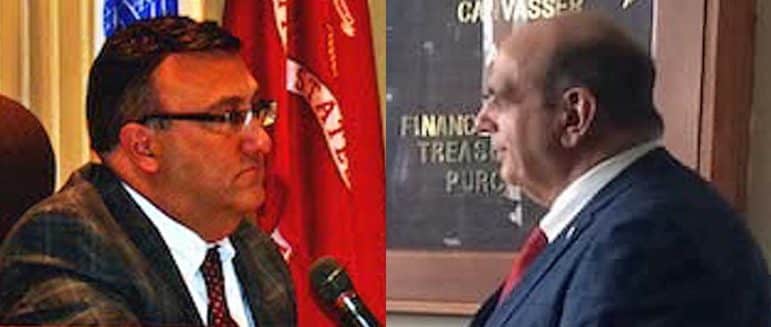

Here’s a look at the top political headlines in 2019, and their potential impact in the upcoming year:
Rifts form between top two city officials
For two men who served on the city council together for decades as members of the same party, Mayor Joseph Solomon and City Council President Steve Merolla found a number of ways to disagree with each other this year, culminating with Merolla’s accusation of Solomon wanting a “dictatorship” because the mayor hadn’t submitted a city solicitor for council review as the City Charter requires.
(Solomon later got council approval to fill the vacant solicitor position.)
That division was a far cry from earlier in the year, when both officials sounded alarms at the city’s fiscal condition, with Solomon announcing at his state of the city address in February that the city was facing huge deficits and a potential huge reduction in its reserve funds to address them.
At the time, Merolla credited Solomon with providing a clear picture of the city’s financial situation, suggesting that the speech marked a new openness between the mayor’s office and the council — but the sense of collaboration wouldn’t last long.
In light of later developments, the council’s approval of Solomon’s proposed FY20 budget on May 31 — which left the school department some $7.7 million short of its original request — marked one of the last public displays of unity before another contentious summer.
School funding flap exposes differences
Once student protests erupted over the council’s decision in early June, Solomon and Merolla positioned themselves on opposite sides of the issue: Solomon refused to give more to the schools based on his disputed claims that he’d already provided the schools with what they needed and that the school committee could use pension contributions to balance its budget, while Merolla offered a $1.5 million increase to the schools to stave off threatened cuts to sports programs.
Neither plan succeeded, as it turned out, though that didn’t stop Solomon and Merolla from trying to spin the results as something far different.
In the midst of the school budget feud, the Boston Globe published an article based on a leaked city council report claiming that the city faces huge tax increases for the foreseeable future because of its retirement costs.
Solomon said of the report, “You can blow your nose with it,” a clear broadside against Merolla and the council.
The uncertainty over the city’s fiscal condition persisted until the release of the long delayed FY18 audit, which refuted many of Solomon’s claims about that budget.
A later announcement by S&P Global Ratings affirmed the city’s ‘AA’ bond rating, further disproving the claims of financial calamity that both men had issued months earlier.
With the council’s vote on July 23 to give the schools another $3.9 million, the FY20 budget was settled — but that couldn’t be said for the clear divisions that had formed between the mayor and the council president.
Rancor persists through end of year
After the budget controversy subsided, Solomon and Merolla clashed on other issues like the city solicitor appointment and, in the waning days of the year, Solomon’s proposed contract with the fire union.
Following a marathon finance committee meeting on Dec. 16, the council set a new session for Jan. 7 to discuss the contract. This, apparently, did not sit well with Solomon, who had constables deliver the notice of a hastily-arranged meeting called by some city councilors for Dec. 20.
Merolla didn’t take to the mayor’s maneuvering very well, to say the least.
Shortly after opening the Dec. 20 meeting, Merolla announced that longtime council solicitor John Harrington had resigned, and then confirmed with new solicitor William Conley that the session was, in fact, illegal because two councilors had not received the notice for it.
It was another embarrassing (and avoidable) misstep for Solomon, who had prematurely announced a fire contract deal in May, only for the union to reject it.
Split likely to continue in 2020
Heading into the new year, the tension between the mayor’s office and the city council seems unlikely to subside, especially as the school department prepares its FY21 budget and looks into the possibility of building a new high school, which Merolla has publicly supported while Solomon remained noncommittal.
The council’s decision to back the $180 million plan marks a significant (and potentially confusing) departure from its earlier stance toward the school department, and suggests that councilors may be considering how it benefits their election prospects at least as much as how the new school would help the city’s education system.
At the same time, Solomon seems willing to keep drumming up disputes with the council over fundamental city operations (like getting contracts and staff approved) while insisting (often incorrectly) that he’s solely responsible for the positive developments in Warwick.
Conclusion: The underlying issues that arose in 2019 promise to continue in 2020, as the upcoming election adds another wrinkle to the often-contentious interactions among city and school officials.
This is a test
